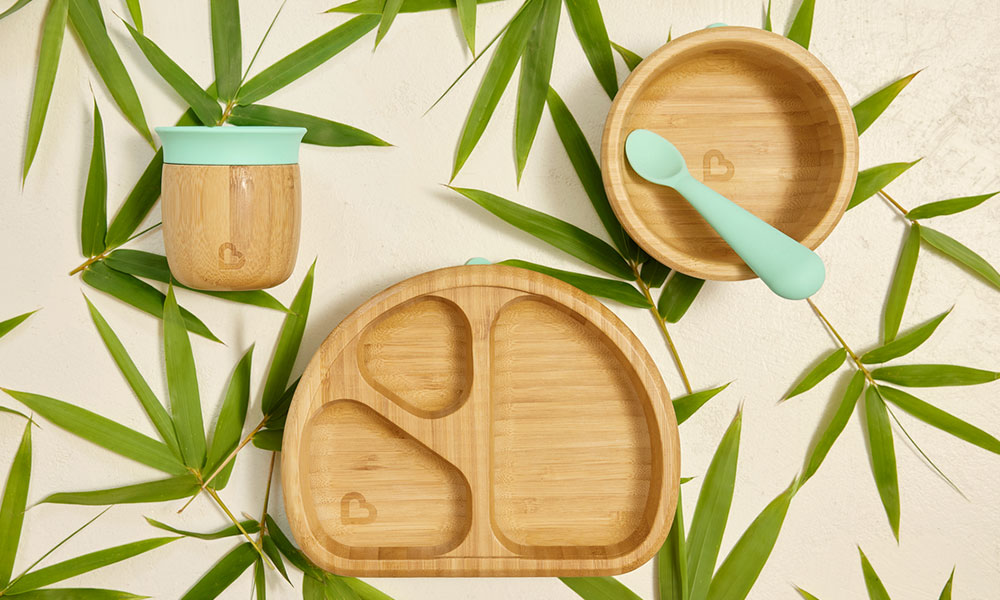If you’re looking to make more sustainable choices this year, but aren’t sure where to start here are a few handy tips:
1. Choose baby products made from sustainable materials
Every time you open your toy cupboards, you might feel like you’re greeted with a tonne of plastic products. But you can easily switch up your standard baby products for more sustainable options.
Take our bamboo feeding range. Our bowls, plates, cups and weaning set are durable and most importantly are made from renewable bamboo. The thin edge and the narrow body of the cup work for small hands, the vertical wall of the bowl makes scooping easy, and the deep plate has an arc design and suction base that better fits table or highchair eating, so they work around your needs as well as doing their bit for the planet. Plus, they look great too.
2. Reduce your plastic consumption where possible
Single use plastic is everywhere and it’s continuing to have a big impact on the world’s oceans. It’s therefore important to try and reduce your single use plastic consumption as much as possible – and just a few changes to your day-to-day life can make a huge difference. Try to:
- Buy loose fruit – fruit doesn’t need to be wrapped in plastic, so simply take a reusable bag to the supermarket and pop your loose fruit in.
- Use bags for life – always have a selection in your car, bag or pushchair for those occasions when you just nip to the shops.
- Switch to paper where you can – straws, paper cups and paper bags can all make a big difference or, better yet, use something reusable.
- Reuse single plastic in your home where possible – those plastic takeaway boxes make great storage boxes for crayons and felt-tips.
3. Use public transport where you can
Ditching the car can be a tough one as a parent, but driving just 10% less can have a huge impact on the environment.
So, if you’re heading local round to a friend’s house or to the park, consider getting your little one in the pram or buggy and taking a walk – it’s great for your exercise resolutions too! If you’re going a little further afield, you can opt for public transport rather than the car, plus getting the train or bus is always a bit of an adventure for little ones.
4. Look into reusable alternatives for disposable items
Just because that’s what everyone uses, doesn’t mean it’s the right thing to do. Yes disposable nappies and wipes are super easy, but they aren’t environmentally friendly. In fact, wet wipes make up 90% of the material causing sewer blockages in the UK. Disposable nappies on the other hand can take up to 500 years to decompose.
Cloth nappies are an eco-friendlier alternative and you can also use baby wipe spray alongside reusable cloth wipes. It might take a little getting used to, but it is a viable alternative.
5. Wash as much as possible on 30°C
As a parent, the washing pile is always daunting. No matter how many washes you put on, it never seems to shrink. It’s an inevitable part of having children, but you can do your bit for the environment by washing as much as possible on 30°C – except for badly soiled items and things like reusable nappies. This will help you cut CO2 emissions, save energy and help the environment.
6. Reduce meat consumption where you can
Cutting your meat consumption is one of the biggest things you can do to help the environment as it reduces greenhouse gas emissions, deforestation and soil degradation. Yes it might be difficult to cut out meat entirely, but you can start by taking baby steps. Just one meal a week without meat will make an impact. And if you’re worried about making sure your family has enough protein, consider using lentils and other pulses which are packed with the stuff.
7. Make sustainable shopping choices
It will likely be much easier to cut down on fast fashion for yourself than it is for your little one – babies and toddlers just grow so fast! But there are things you can do to reduce your environmental impact like passing clothes down to siblings or family members, as well as giving old clothes to charity shops and trying to buy them second-hand. When it comes to toys, you can opt for wooden toys and those made of more sustainable materials rather than plastic, or hold a toy swap with friends or at nursery.
If you’ve decided to be more sustainable this year and do your bit for the environment, there so many small changes you can make to your everyday life that make a big difference. Interested in more baby advice? Simply head to our blog or check out our StrollerCoaster podcast.

Leave a Reply